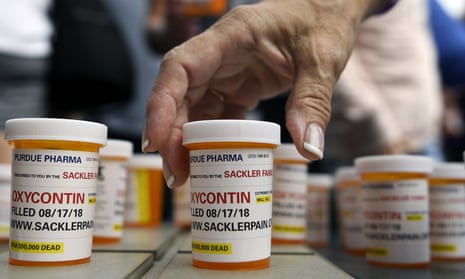Five more US states sued the painkiller maker Purdue Pharma on Thursday, alleging misconduct in the marketing and sales of opioids such as the company’s highly profitable OxyContin narcotic.
Wisconsin, Iowa, Kansas, Maryland and West Virginia filed separate but similar lawsuits, bringing the number of states suing the pharmaceutical company to 45, over its alleged role in the US opioids crisis that has caused thousands of drug overdose deaths. Pennsylvania sued the company two days ago, while New York’s Metropolitan Museum of Art on Wednesday joined a host of cultural and academic institutions in announcing it would stop accepting philanthropy from the Sackler family members behind Purdue Pharma.
The five states that filed on Thursday are also suing Richard Sackler, who was previously Purdue’s co-chairman and president and is one of the leading members of the Sackler family who wholly own the private company.
Sackler has been sued in several other such lawsuits in recent months and Purdue is also being sued by more than 1,500 cities and counties from all across the US.
West Virginia’s lawsuit alleges Purdue Pharma aggressively pushed false claims and deceptive practices, even in the past training new marketing employees with the advertising motto: “We sell hope in a bottle.”
“This lawsuit reveals many years of painstaking investigation,” West Virginia’s attorney general, Patrick Morrisey, said. “The senseless death and ruined lives of untold thousands must stop.”
Purdue Pharma and Richard Sackler have repeatedly and strenuously denied the allegations in the various lawsuits against them, and all wrongdoing.
In Wisconsin, opioids cost 916 lives in the state in 2017, the state’s suit said.
“The opioid epidemic has shattered lives and strained communities across the state and the country,” said Wisconsin’s attorney general, Josh Kaul. “Today, we filed suit … alleging that they misled the public and medical professionals about both the benefits of and the dangers posed by OxyContin and other opioids, and that the opioid epidemic is partly attributable to their conduct.”
Wisconsin’s lawsuit, filed in Dane county circuit court, seeks a permanent injunction, abatement of the public nuisance, and civil penalties. It alleges that the corporate entities Purdue Pharma LP and Purdue Pharma Inc, and Sackler repeatedly made false and deceptive claims regarding opioids, including OxyContin.
Purdue Pharma’s deceptive and false marketing created a shift in the understanding of the effectiveness and danger of opioids, the complaint alleges. “In order to combat the concerns about opioids being abused, Purdue deployed an aggressive marketing campaign that sought to increase sales of OxyContin, while changing the accepted norms about opioid prescribing.”
The Wisconsin complaint further alleges that, after a 2007 settlement in a federal criminal case against Purdue and some of its leading executives, in a case that did not include any charges against any members of the Sackler family, Purdue continued to engage in false, deceptive and misleading marketing practices in relation to its prescription painkiller and the risks of addiction, abuse and death.
Kaul alleges that Purdue and Richard Sackler were fully aware of the potential profits of OxyContin.
OxyContin was launched in the mid-90s as a breakthrough in pain relief, because of its formula for controlled, sustained release of its active ingredient, which is derived from the opium poppy.
Iowa’s attorney general, Tom Miller, said: “Purdue Pharma is responsible for a public health crisis that has profoundly affected patients, their families, our communities, and our healthcare system,” Miller said. “The company and its executives were recklessly indifferent to the impact of their actions, despite ever-mounting evidence that their deceptions were resulting in an epidemic of addiction and death.”
Purdue Pharma issued a statement on Thursday, saying: “Purdue Pharma vigorously denies the allegations in the lawsuits filed today and will continue to defend itself against these misleading attacks.”
The company pointed to the significant recent development in its favor that North Dakota’s state lawsuit against it was thrown out earlier this month, and noted that: “As the judge stated in his decision, one company cannot be held accountable for a complex public health issue such as the opioid crisis.”
The North Dakota attorney general is appealing against the decision.
On Thursday, in response to the latest flurry of lawsuits, Purdue added: “These complaints are part of a continuing effort to try these cases in the court of public opinion rather than the justice system. The states cannot link the conduct alleged to the harm described, and so they have invented stunningly over-broad legal theories, which if adopted by courts, will undermine the bedrock legal principle of causation.”
